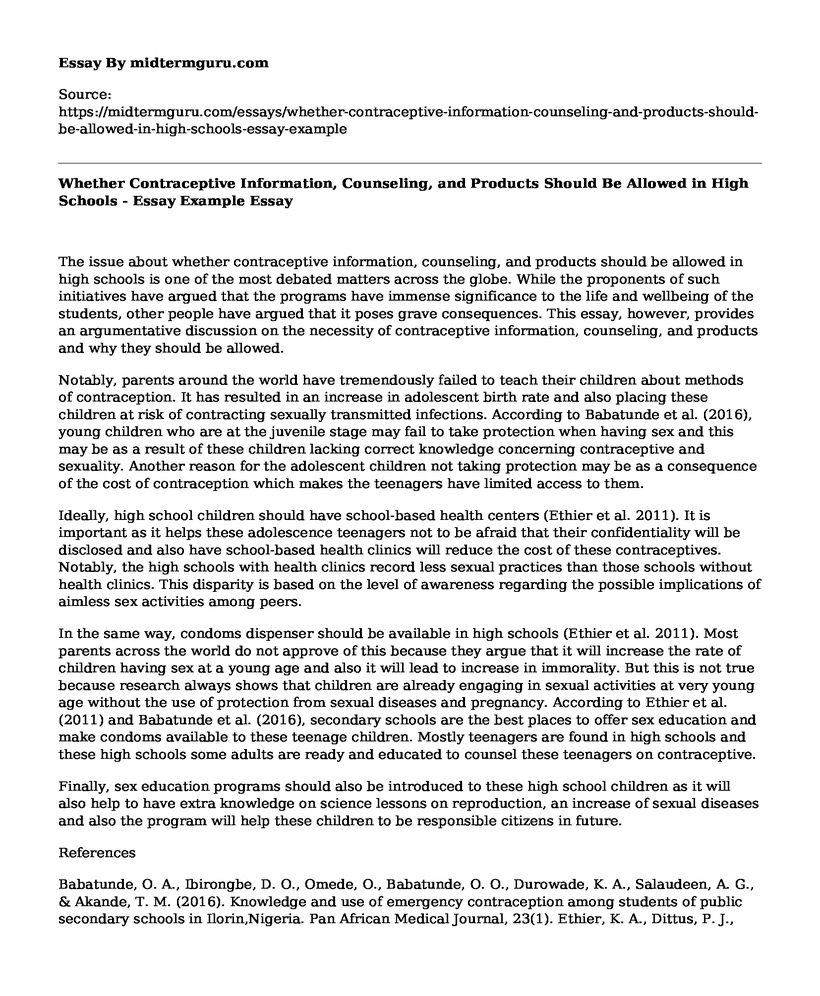The issue about whether contraceptive information, counseling, and products should be allowed in high schools is one of the most debated matters across the globe. While the proponents of such initiatives have argued that the programs have immense significance to the life and wellbeing of the students, other people have argued that it poses grave consequences. This essay, however, provides an argumentative discussion on the necessity of contraceptive information, counseling, and products and why they should be allowed.
Notably, parents around the world have tremendously failed to teach their children about methods of contraception. It has resulted in an increase in adolescent birth rate and also placing these children at risk of contracting sexually transmitted infections. According to Babatunde et al. (2016), young children who are at the juvenile stage may fail to take protection when having sex and this may be as a result of these children lacking correct knowledge concerning contraceptive and sexuality. Another reason for the adolescent children not taking protection may be as a consequence of the cost of contraception which makes the teenagers have limited access to them.
Ideally, high school children should have school-based health centers (Ethier et al. 2011). It is important as it helps these adolescence teenagers not to be afraid that their confidentiality will be disclosed and also have school-based health clinics will reduce the cost of these contraceptives. Notably, the high schools with health clinics record less sexual practices than those schools without health clinics. This disparity is based on the level of awareness regarding the possible implications of aimless sex activities among peers.
In the same way, condoms dispenser should be available in high schools (Ethier et al. 2011). Most parents across the world do not approve of this because they argue that it will increase the rate of children having sex at a young age and also it will lead to increase in immorality. But this is not true because research always shows that children are already engaging in sexual activities at very young age without the use of protection from sexual diseases and pregnancy. According to Ethier et al. (2011) and Babatunde et al. (2016), secondary schools are the best places to offer sex education and make condoms available to these teenage children. Mostly teenagers are found in high schools and these high schools some adults are ready and educated to counsel these teenagers on contraceptive.
Finally, sex education programs should also be introduced to these high school children as it will also help to have extra knowledge on science lessons on reproduction, an increase of sexual diseases and also the program will help these children to be responsible citizens in future.
References
Babatunde, O. A., Ibirongbe, D. O., Omede, O., Babatunde, O. O., Durowade, K. A., Salaudeen, A. G., & Akande, T. M. (2016). Knowledge and use of emergency contraception among students of public secondary schools in Ilorin,Nigeria. Pan African Medical Journal, 23(1). Ethier, K. A., Dittus, P. J., DeRosa, C. J., Chung, E. Q., Martinez, E., & Kerndt, P. R. (2011). School-based health center access, reproductive health care, and contraceptive use among sexually experienced high school students. Journal of adolescent health, 48(6), 562-565.
Cite this page
Whether Contraceptive Information, Counseling, and Products Should Be Allowed in High Schools - Essay Example. (2021, May 31). Retrieved from https://midtermguru.com/essays/whether-contraceptive-information-counseling-and-products-should-be-allowed-in-high-schools-essay-example
If you are the original author of this essay and no longer wish to have it published on the midtermguru.com website, please click below to request its removal:
- Paper Example on Homophobia and Construction of Gender Inequality Through the Media
- Paper Example on Issues of Marriage and Sexuality in Christianity
- The Theme of Gender and Sexuality in Ancient Rome - Essay Sample
- Improving Sexual Health Services in UK: Accessible & High Quality - Essay Sample
- Dad Accused of Sexual Abuse Based on Daughter's Recovered Memory - Essay Sample
- Gay Rights are Human Rights: Argumentative Essay
- Paper Example on Mental Health among the LGBTI Community







